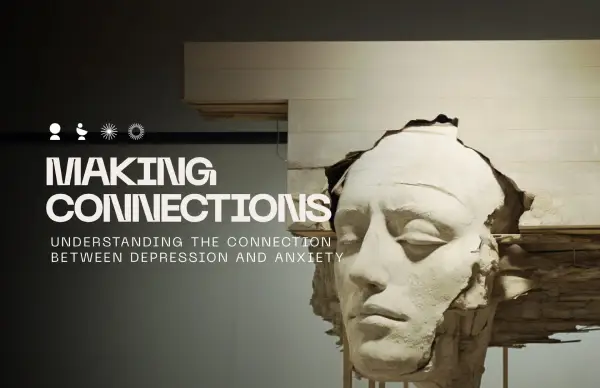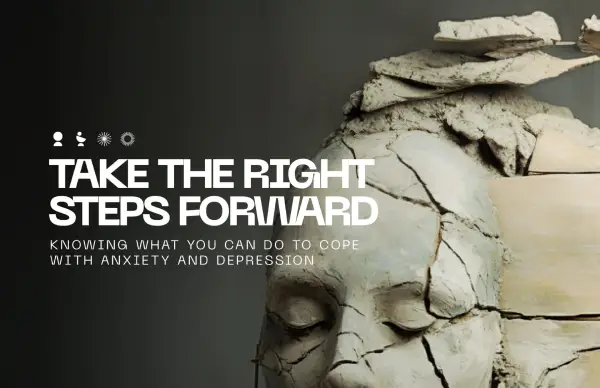Blog
Where is my anxiety + depression coming from & how do i treat it

Contents
What is anxiety?
What is depression?
How are depression and anxiety connected?
How are they different?
Tips to cope with anxiety and depression
When to seek professional help
Treating depression and anxiety
People around the world struggle with depression and anxiety. There are some overlapping symptoms of the two and some key differences. Learn to diagnose which one you have to get the correct treatment.
Anxiety and depression can result from different factors. Society struggles with these disorders, whether it be environmental or genetic.
Discover everything there is to know about anxiety and depression. Find out the primary symptoms and their causes. Learn when to seek help and what treatments work.
What is anxiety?
Fear and worry are normal emotions people feel in everyday life. It may be a sign of an anxiety disorder if these feelings don’t go away. You may struggle with an anxiety disorder if you feel excessive worry or fear.
Anxiety disorders are worse than worrying about challenging or unexpected life circumstances. Your worries may center on health, work, or relationships. These fears can cause lingering feelings of anxiety that affect daily life.
You may wonder, why am I anxious? There are a few causes of severe worrying. There are also different forms and symptoms.
Forms
You may wonder, is anxiety a mood disorder? There are a few different issues that each bring their complications.
- Specific phobias: we can relate phobias to animals like cats, dogs, or spiders. Some patients have phobias about the natural environment, like heights, water, or blood. You may need help to enter elevators, enclosed spaces, or airplanes.
- Generalized anxiety disorder: GAD is an overall worry about several aspects of life.
- Social anxiety disorder: SAD is having a fear of being in other people’s company or in social situations.
- Panic disorder: an abrupt surge of intense discomfort or fear.
- Separation anxiety: an excessive fear about separating yourself from items or figures.
Symptoms
There are a few primary symptoms of an anxiety disorder.
- Cranky
- On edge
- Feeling like you’re out of control
- Overwhelmed by worry or fear
- Sweaty or shaky
- A sense of doom, dread, or panic
- Sleep issues
- Constant fatigue
- Headaches
- Muscle tension
- Nausea
- Diarrhea
- Brain fog
What is depression?
It’s not out of the ordinary to feel low, sad, or hopeless. Most people experience these emotions during painful or difficult life situations.
Feeling empty or sad for longer than two weeks is an indicator of depression. Patients may not feel happy even if joyful events occur in their lives. Doctors diagnose depression when the feelings have persisted for at least two weeks.
Forms
Depression comes in all shapes and sizes. There are two primary forms of this disorder.
- Persistent depressive disorder: occurs every day for up to or at least two years.
- Major depressive disorder: lasts for a two-week period. It can be a recurrent or single episode.
Symptoms
The primary symptoms of depression are an empty mood and feeling low or sad. There are other vital signs to look out for.
- Burnout.
- Loss of enjoyment or interest in your usual hobbies and activities.
- Anger, restlessness, irritability.
- A sense of pessimism or hopelessness.
- A lack of energy.
- Feeling slowed down.
- Sleep problems.
- Chronic fatigue.
- Difficulty deciding, concentrating, or remembering information.
- Feelings of worthlessness, guilt, or hopelessness.
- Unexplained pains or aches.
- Gastrointestinal concerns.
- Thoughts of death, suicide, or dying.
- Eating less or more than usual.
How are depression and anxiety connected?
Patients can have a mixed anxiety and depressive disorder. They may struggle with forms of both disorders.
Overlapping symptoms
There are a few symptoms that show up in both anxiety and depression.
- Changes in energy level
- Changes in sleep patterns
- Increased irritability
- Aches and pains
- Stomach issues with no clear cause
- Trouble with focus, concentration, and memory
Causes
There are a few causes for both disorders.
- Environment
- Personality
- Genetics
- Life events
How are they different?
Depression and anxiety provide common symptoms, but they have different signs as well. It’s ideal to identify whether you have anxiety or depression to treat it efficiently.
There are primary signs of anxiety that don’t occur with depression.
- You can’t stop thinking about events that worry you, even if you can’t do anything about them.
- You feel stuck in a cycle of exploring how a situation could go south.
Depression causes symptoms that don’t show up in anxious patients.
- Fixating on guilt, as you don’t have enough energy to socialize.
- Fixating on past events, blaming yourself for events you don’t have control over.
Tips to cope with anxiety and depression
So, how do you cope with an anxiety or depression episode? There are a few tips to help ease situations in which you have trouble with these disorders.
Focus on the facts
A big issue with anxiety or depression is focusing on “what-ifs.” Aim to focus on the facts and tell yourself what’s real and what’s not. This technique may help ease your symptoms of worry or paranoia.
Routine
Keeping a consistent routine is a great way to combat anxiety or depression. It helps structure your life, giving you a sense of control. A schedule can aid in building a space in your day for self-care techniques.
Good sleep
Getting a good night’s sleep is vital in treating anxiety or depression. Not enough rest may worsen your condition. You should get between seven and nine hours of sleep each night.
There are a few tips to help you fall asleep.
- Turn off electronic devices an hour before bedtime.
- Make a habit of sleeping and waking up at the same time each day.
- Keep your bedroom cool, quiet, and dark.
- Create a relaxing ritual to wind yourself down.
Diet
Nutrition for mental health is essential. Sometimes, all we need is the proper diet to get us moving again. Nutritious foods naturally boost your energy and mood. Opt for healthy fats like nuts and seeds. Choose lean proteins for your meal plans.
Go with a colorful plate. Add fruits and veggies to your daily meals. Avoid sugar, alcohol, caffeine, and processed food. Eat in moderation and only indulge occasionally. A balanced meal can go a long way.
Exercise
Therapists and doctors suggest exercise as a way to ease anxiety or depression. Research proves that being active is a natural mood-booster. It raises your confidence and self-esteem and may improve your relationships.
Rest and relaxation
Practicing relaxation techniques is a great anxiety and depression treatment. Patients follow meditation, yoga, and breathing exercises. Meditate for around 2–5 minutes daily to ease your anxiety, lightening your mood.
There are a few other key strategies to follow.
- Picture a pretty image in your mind.
- Focus on your breathing.
- Repeat a mantra.
Reach out to loved ones
Solid relationships naturally improve your mood. Reach out to loved ones if you’re feeling down or anxious. Family and friends can help bring you out of your slump. Let them know you’re struggling, and they should come to your aid.
You may need to opt for professional help if family and friends don’t fix the problem.
When to seek professional help
Sometimes, self-care routines aren’t enough to ease your anxiety or depression. You may need to contact a professional if you have a few complicated issues.
- You don’t take part in activities you used to enjoy.
- You find daily life challenging to function in.
- You struggle to get out of bed.
Treating depression and anxiety
Learning how to deal with anxiety and depression is vital in moving on. You may need to discover other ways to ease the symptoms. A professional can treat you with medication or therapy.
Therapy
Cognitive-behavioral therapy is one of the primary ways to treat depression or anxiety. Dialectical behavioral therapy is another method that has proven beneficial for patients.
Medication
Medication is another vital treatment for anxiety and depression. Your healthcare professional may prescribe you antidepressants to help deal with your symptoms.
Selective serotonin reuptake inhibitors (SSRIs) are the primary medication for these disorders.
- Celexa
- Prozac
- Lexapro
- Paxil
- Zoloft
Some patients take serotonin and norepinephrine reuptake inhibitors (SNRIs) instead.
- Cymbalta
- Effexor
- Prisiq
NAD+
NAD+ is an up-and-coming technique to deal with stress, depression, and anxiety. It helps the body boost its ability to recover from stress. Research shows it’s highly effective in elevating mood and reversing feelings of anxiety or depression.
The down low
Depression and anxiety are common mental illnesses that people worldwide struggle with. There are several symptoms of both of them, some overlapping. You can treat these disorders yourself or seek help from a medical professional.
Visit our blog to learn more about your body and how it works. You may find just what you’re looking for.
Author: Dr. Jason Phan NMD – Founder of LIVV Natural – Anti-aging – regenerative medicine – peptide therapy


